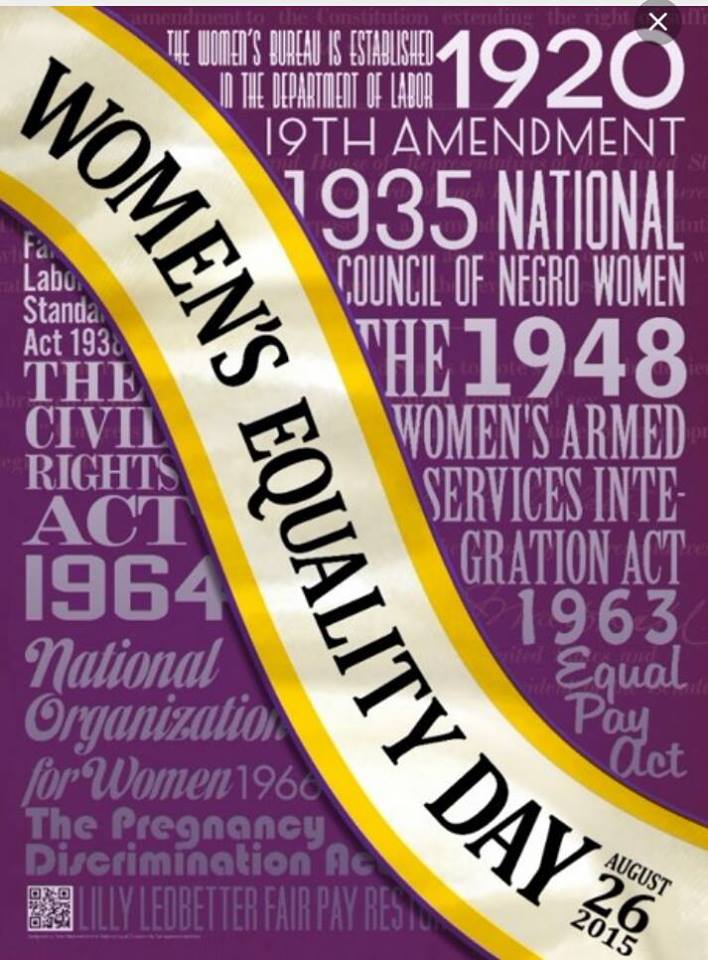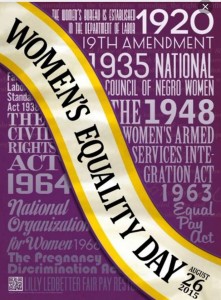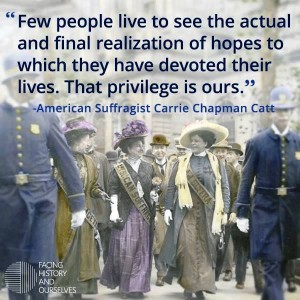On that beautiful day when the women’s suffrage amendment was finally ratified, Alice Paul boldly declared, “August 26 will be remembered as one of the great days in the history of the women of the world and in the history of this republic.”
Unfortunately, time has proven Alice Paul wrong. On August 26, 2015, the media said almost nothing about Women’s Equality Day. Major outlets like The New York Times (NYT), The Christian Science Monitor and CNN ignored it. And there was no Google Doodle.
The media outlets that did cover it often wrote tired tomes about the obstacles that women still face and ignored the brilliance and heroism of Elizabeth Cady Stanton, Susan B. Anthony, Ida Wells and Alice Paul.
You would never know from these articles that the fight for American women’s suffrage began in 1848 when Elizabeth Cady Stanton boldly declared, “This right is ours”; that Susan B. Anthony was arrested for voting in 1872; that suffragists were treated brutally in prison and that Alice Paul was forced to undergo a psychiatric exam and could have ended up in a mental institution. Forbes unwittingly summed up the media’s patronizing attitude in its own article, “Women Are Still Waiting for Equal Treatment.” It added insult to injury by noting that women were “given” the vote.
It’s easy to say that media coverage was awful because we’re still in a male chauvinistic society. However, that argument starts to break down when we see that the media regularly covers issues like the pay gap, the housework and childcare gap, the glass ceiling and men’s violence against women – largely because feminist groups insist on it. It continues to break down when we see that America, even with all its racism, still celebrates Martin Luther King Day – largely because the Civil Rights Movement demands it. And it breaks down further when we see that the military, powerful as it is, still has to remind the public that Memorial Day is not commemorated because that’s the day when the swimming pool opens.
The media doesn’t respect Women’s Equality Day because women’s history groups and feminist organizations have not demanded that they do it. National Organization for Women, The Feminist Majority Foundation and other activist groups have not used their online Action Alert capabilities to remind members to “slam the servers” and insist that the NYT, the Google Doodle team, and other major media outlets treat Women’s Equality Day with the respect it deserves (and to stop ignoring the sacrifices of Alice Paul and other great activists). Likewise, the National Women’s History Project, the Alice Paul Institute, the Susan B. Anthony House and Museum, and the Elizabeth Cady Stanton Hometown Association don’t have any Action Alert capabilities, although it would be fairly straightforward to develop them since they already have sizeable email lists.
I have heard an endless variety of explanations for the American women’s movement’s passivity with the media on Women’s Equality Day– burnout; lack of funding; job concerns; the view that history is a luxury item; the dread of more arguments about racism in the early feminist movement, misogyny in the abolitionist and Civil Rights movements, Elizabeth Cady Stanton and Susan B. Anthony’s “true” views on abortion; . . . all of these explanations are valid.
Nevertheless, women’s history is an essential topic and we activists have a responsibility to see that the media covers it with the depth and respect it deserves. If we let the world forget the achievements of our foremothers, we are not going to have much of a feminist movement in the future. Most women are not going to sign up for a movement that implies, “Your sacrifices will be forgotten.”
It’s going to take a while for Alice Paul’s statement about August 26th to come true. And yet,  there were a few signs of hope this year. Aol.com got it right when they called Women’s Equality Day “a time to honor and inspire” and posted Ginny Barnes’ powerful Vanity Fair video, My First March, a short drama about a woman preparing for her first suffrage march. The acclaimed British film, Suffragette, is scheduled for American release in October. And online activists scored a victory when the National Dog Day leaders moved their celebration from August 26th to August 31st because of all the protests.
there were a few signs of hope this year. Aol.com got it right when they called Women’s Equality Day “a time to honor and inspire” and posted Ginny Barnes’ powerful Vanity Fair video, My First March, a short drama about a woman preparing for her first suffrage march. The acclaimed British film, Suffragette, is scheduled for American release in October. And online activists scored a victory when the National Dog Day leaders moved their celebration from August 26th to August 31st because of all the protests.
But the most brilliant sign of hope came from the French group, Osez le Féminisme (Dare to be Feminist). On a day that is not an official French holiday, they changed all the street names in the île de la Cité in Paris to celebrate great women, including the  feminists Simone de Beauvoir and Audre Lorde. I don’t know if Osez le Féminisme had Women’s Equality Day in mind when they changed the street names. Nevertheless, they did a great job of showing us how to celebrate our holiday.
feminists Simone de Beauvoir and Audre Lorde. I don’t know if Osez le Féminisme had Women’s Equality Day in mind when they changed the street names. Nevertheless, they did a great job of showing us how to celebrate our holiday.
Some activists are telling me to be patient because there are plans for a great extravaganza in 2020. However, Alice Paul can not wait that long and neither can I. We’re not expecting an big anniversary bash every single year. We just want recognition and respect, along with a commitment to continue doing feminist activism and assurance that activists’ sacrifices will not be forgotten. If our country really believes in “equality and justice for all” and if women really value the hard-earned achievements of their foremothers, we will start coming closer to fulfilling Alice Paul’s dream about August 26th. And we won’t have to wait until 2020.



